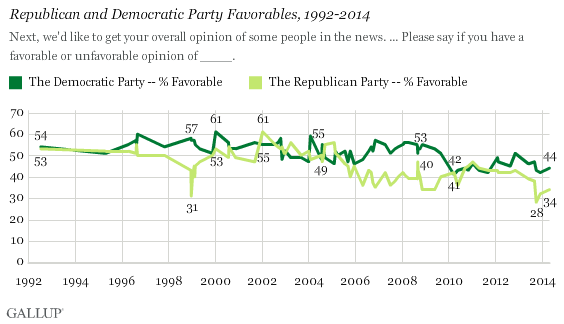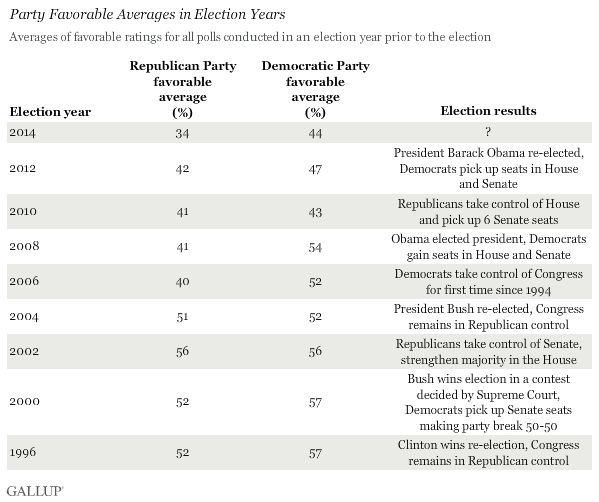More proof that everyone hates Washington — and why it won't matter in November
Cratering popularity for each party is just one part of the story


If the past is any indication — and it usually is — Republicans should tread carefully with their latest Benghazi investigation. Unless they actually find a truly smoking gun — and so far countless probes have failed to do so — 20 years' worth of data suggests the GOP will wind up shooting itself in the foot.
The data comes from Gallup. The polling firm looked at the popularity of both major parties going back to the early 1990s, and drew a clear connection between GOP escapades designed to fire up its base and the party's sinking reputation with the American people as a whole. There have been two Republican low points over the last 20 years — a 31 percent approval in late 1998, just as the GOP led the fight to impeach President Bill Clinton, and a 28 percent approval last fall, when conservative members of the House shut down the federal government in a quixotic attempt to kill ObamaCare.
The data suggests that these hyperpartisan, proactive events wound up damaging the Republicans in the eyes of the American people. Both did, however, help the GOP fire up its base and raise money, not inconsequential things. Getting your base to write checks and show up at the polls is how you win elections.
The Week
Escape your echo chamber. Get the facts behind the news, plus analysis from multiple perspectives.

Sign up for The Week's Free Newsletters
From our morning news briefing to a weekly Good News Newsletter, get the best of The Week delivered directly to your inbox.
From our morning news briefing to a weekly Good News Newsletter, get the best of The Week delivered directly to your inbox.
We're seeing this again now. The GOP-led Benghazi panel is galvanizing the Republican base, and is being attached to fundraising pleas, even as most Americans shrug.
Meantime, Democrats have problems of their own. While the GOP has seen its favorability rating plummet 19 percentage points over the last two decades, the Dems have seen their favorability rating sink a still-worrisome 10 percentage points.

Yep, Democrats aren't exactly basking in popularity, either. Their approval peaked at 61 percent way back in 2000, in the aftermath of the Clinton impeachment. It had a small bump in 2008 when Obama was elected. But Democrats — and the president himself — have slid ever since, hovering in the low-to-mid 40s since 2010.
But here's the thing: Overall popularity isn't all it takes to win elections. It's also about turnout, as well as intradistrict and intrastate popularity. This chart tells the story:
A free daily email with the biggest news stories of the day – and the best features from TheWeek.com

For an entire generation, there hasn't been a single presidential election year in which the Republican Party has had a higher approval rating than the Democratic Party. With the exception of 2004, Democrats have won the popular vote in every single presidential election during this period — 1996, 2000, 2008, 2012. But in midterm years, Republicans tend to do well. In 2002, they upped their House majority and seized the Senate. In 2010, a wave election gave them control of the House, and a pickup of six Senate seats. The only midterm election during this period in which Republicans fared poorly was 2006, when rising discontent with George W. Bush helped Democrats take control of Congress for the first time since 1994.
Thanks to gerrymandering fueled by the GOP's gubernatorial and statehouse sweeps in 2010, today's congressional districts are drawn extremely favorably for House Republicans. In many districts, GOP representatives can honestly say shutting down the government over ObamaCare is exactly what their constituents want them to do, even as such actions crater the party's popularity nationally.
So even though the GOP's favorability rating is in the tank, you can probably expect Republican gains in the House in November — four to six seats, perhaps, and anywhere from three to eight in the Senate. The GOP needs to pick up six seats in the Senate to win control, and it's quite possible they'll do it, given that seven Senate Democrats are defending seats in states won by Mitt Romney in 2012.
Here's what will happen if Republicans gain in the House and take back the Senate in November: They'll crow about how they're on the right track, how most Americans support their policies, and what a repudiation of Barack Obama it was. But what it really means is that they did a better job of getting their base — largely white, older, and male — to the polls in key districts and key states. It won't say diddly squat about 2016.
An award-winning member of the White House press corps, Paul Brandus founded WestWingReports.com (@WestWingReport) and provides reports for media outlets around the United States and overseas. His career spans network television, Wall Street, and several years as a foreign correspondent based in Moscow, where he covered the collapse of the Soviet Union for NBC Radio and the award-winning business and economics program Marketplace. He has traveled to 53 countries on five continents and has reported from, among other places, Iraq, Chechnya, China, and Guantanamo Bay, Cuba.
-
 Moon dust has earthly elements thanks to a magnetic bridge
Moon dust has earthly elements thanks to a magnetic bridgeUnder the radar The substances could help supply a lunar base
-
 World’s oldest rock art discovered in Indonesia
World’s oldest rock art discovered in IndonesiaUnder the Radar Ancient handprint on Sulawesi cave wall suggests complexity of thought, challenging long-held belief that human intelligence erupted in Europe
-
 Claude Code: the viral AI coding app making a splash in tech
Claude Code: the viral AI coding app making a splash in techThe Explainer Engineers and noncoders alike are helping the app go viral
-
 The billionaires’ wealth tax: a catastrophe for California?
The billionaires’ wealth tax: a catastrophe for California?Talking Point Peter Thiel and Larry Page preparing to change state residency
-
 Bari Weiss’ ‘60 Minutes’ scandal is about more than one report
Bari Weiss’ ‘60 Minutes’ scandal is about more than one reportIN THE SPOTLIGHT By blocking an approved segment on a controversial prison holding US deportees in El Salvador, the editor-in-chief of CBS News has become the main story
-
 Has Zohran Mamdani shown the Democrats how to win again?
Has Zohran Mamdani shown the Democrats how to win again?Today’s Big Question New York City mayoral election touted as victory for left-wing populists but moderate centrist wins elsewhere present more complex path for Democratic Party
-
 Millions turn out for anti-Trump ‘No Kings’ rallies
Millions turn out for anti-Trump ‘No Kings’ ralliesSpeed Read An estimated 7 million people participated, 2 million more than at the first ‘No Kings’ protest in June
-
 Ghislaine Maxwell: angling for a Trump pardon
Ghislaine Maxwell: angling for a Trump pardonTalking Point Convicted sex trafficker's testimony could shed new light on president's links to Jeffrey Epstein
-
 The last words and final moments of 40 presidents
The last words and final moments of 40 presidentsThe Explainer Some are eloquent quotes worthy of the holders of the highest office in the nation, and others... aren't
-
 The JFK files: the truth at last?
The JFK files: the truth at last?In The Spotlight More than 64,000 previously classified documents relating the 1963 assassination of John F. Kennedy have been released by the Trump administration
-
 'Seriously, not literally': how should the world take Donald Trump?
'Seriously, not literally': how should the world take Donald Trump?Today's big question White House rhetoric and reality look likely to become increasingly blurred
